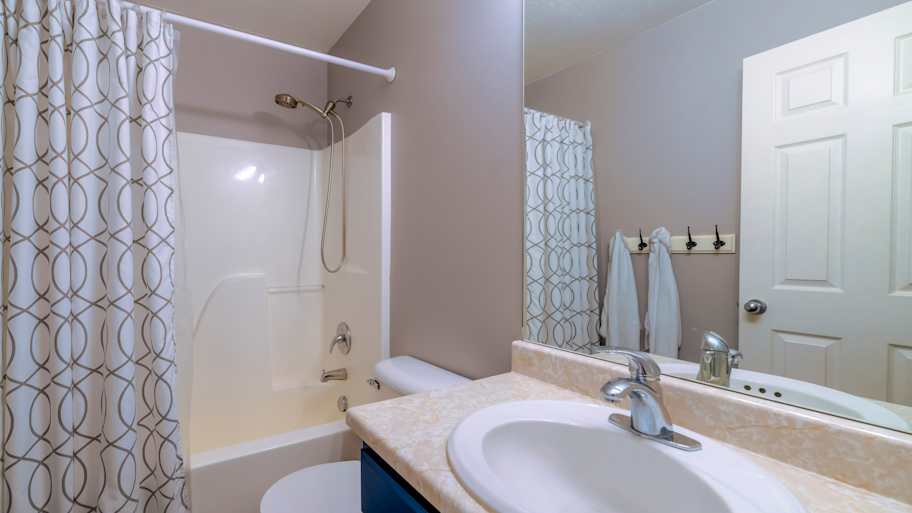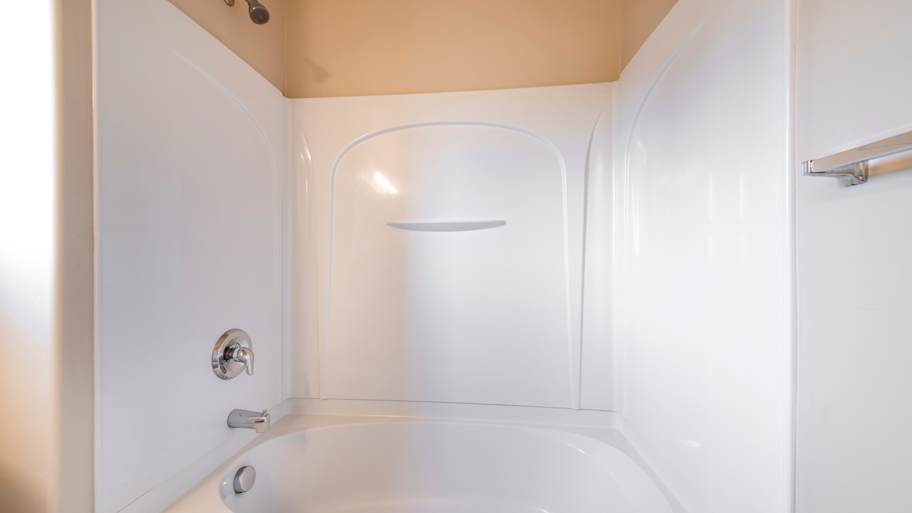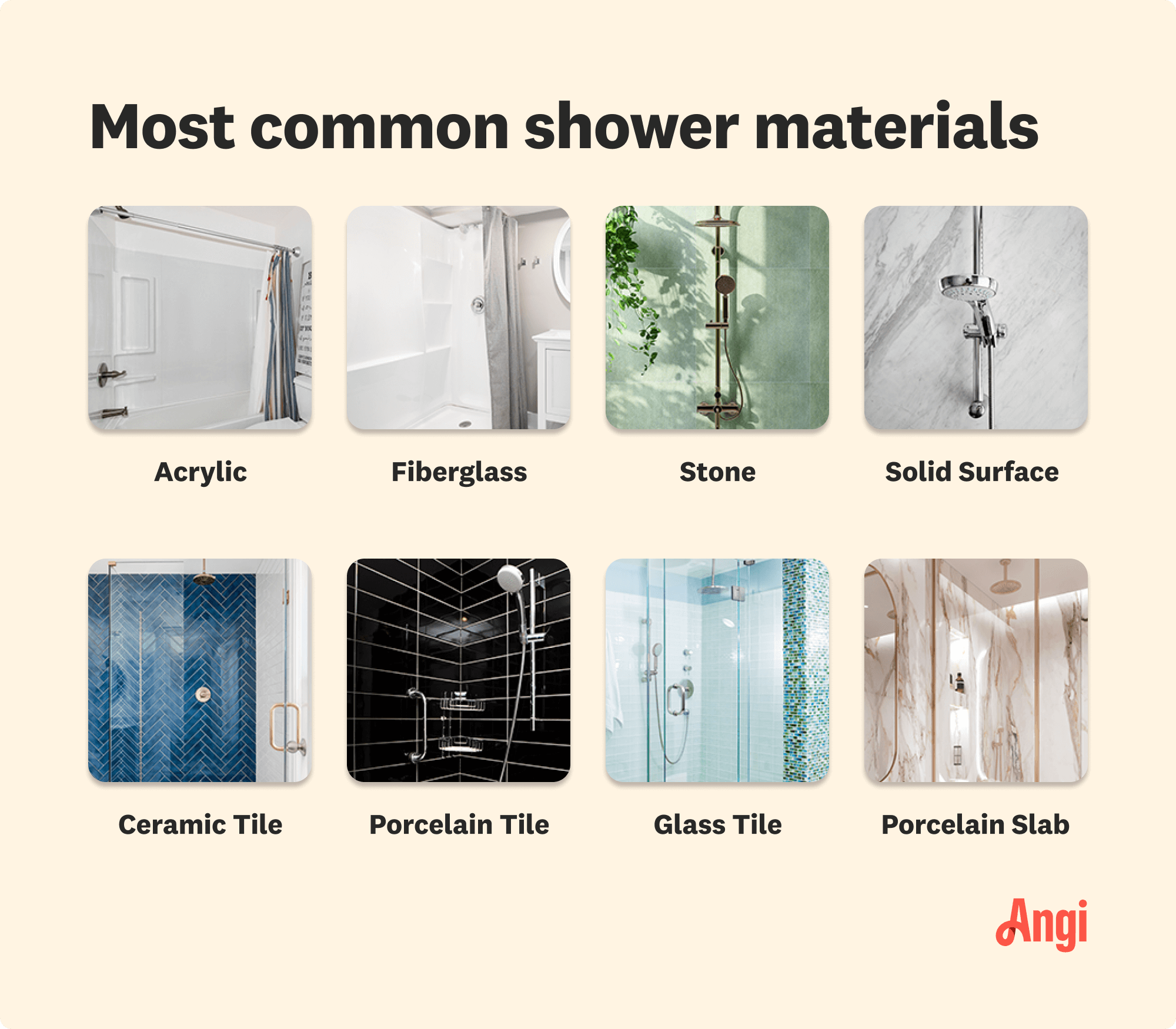
Do you want to add a mudroom to your home but are unsure if it’s within your budget? Use this mudroom addition cost guide to determine your installation price range.
Don’t gloss over your shower material choices


Acrylic shower walls are made from solid sheets of plastic-like materials.
There are often no grout lines in acrylic shower walls, making cleaning easier.
Acrylic is a more affordable shower material than natural stone and tile.
DIY shower installations are much easier with acrylic shower walls than tile.
You’ll likely see a lower ROI with acrylic showers than with luxury shower materials.
If you’re remodeling your bathroom, you’ve probably come across the option of acrylic as a possibility for your shower material. Shower walls made from this material have become popular due to affordability and easy installation, but digging a bit deeper into acrylic wall pros and cons can help you make the best decision for your new bathroom. Like with any material, acrylic comes with its own set of perks and drawbacks. That’s why we’re going to break down the details so you can determine if acrylic walls are a good fit for your shower.
The defining characteristic of acrylic shower walls is that they are made from a solid sheet of acrylic plastic. Molded into smooth and seamless panels, these shower walls have no grout lines to deal with. The material is also lightweight, non-porous, and resistant to mold and mildew, making acrylic a suitable, practical material for shower walls.
| Pros | Cons |
|---|---|
| Cost-effective | Less customizable |
| Easy installation | Prone to damage |
| Low-maintenance | Lower ROI than other materials |
| Easy to clean | Sensitive to harsh chemicals |
| Waterproof and mold/mildew-resistant | Less aesthetic |

Through a mix of durability, simplicity, and affordability, acrylic has gained popularity in recent years when it comes to both new bathroom construction and renovations. Let’s break down the benefits of this shower wall material for your next upgrade.
Shower installation cost is a big consideration when you’re planning your bathroom upgrade, and acrylic walls are on the more affordable side of the shower material spectrum. This is especially true when compared to other popular shower materials like natural stone or ceramic tile. Since they’re prefabricated, they’re DIY-friendly, which also reduces labor costs. This is good news for strict bathroom remodeling budgets and tight renovation schedules.
Their prefabricated nature makes working with acrylic shower walls much simpler, especially when compared to complicated tile work. Coming pre-molded in large sheets, installation is fast, with most acrylic panels able to be installed in a single day. This significantly reduces down time for this critical home space, and DIYers love the simplified installation process.
Acrylic shower walls have a non-porous, smooth surface with no grout lines. This means you’ll do less battle with dirty or cracking grout. Leaks are also less of an issue since there aren’t any crevices for moisture to seep into, so you won’t have as many issues with mold or mildew in your new shower.
That smooth, sleek surface also has the added benefit of being quick and easy to clean. Acrylic panels can be cleaned with mild soap and a soft cloth, and you’ll hardly ever need to scrub like you would in bathrooms with grout lines (and you won’t need to use harsh cleaners). A quick wipe-down is all that’s needed to keep the surface looking fresh.
Acrylic is made from plastic-like materials and is inherently waterproof. It won’t absorb water like some other common shower materials, so you won’t have to seal or reseal it. When acrylic shower walls are installed correctly by a shower remodeling pro, their seamless panels have a watertight seal that prevents seepage and moisture damage.
Despite their many advantages, acrylic shower walls are not without their drawbacks. If you’re considering this option in your new bathroom, here are a few downsides to keep in mind.
Acrylic shower panels come in a limited range of styles, textures, and colors when compared to other options. This means that if your goal for your new bathroom space is to incorporate interesting textures, detailed patterns, or unique finishes, acrylic could fall short. For those looking for a personalized shower wall design, other materials like tile may be a better option.
While it’s reasonably durable, acrylic is more prone to scratches than tougher and harder materials like stone or porcelain tiles. Over time and with daily wear and tear—especially when introduced to harsh cleaning materials or hard water—acrylic shower surfaces can fade and get dull. Only use non-abrasive cleaners to prolong acrylic’s appearance.
When thinking about resale value, acrylic showers don’t elevate your bathroom to the level of other higher-end materials like porcelain tile, marble, or quartz. While it’s an affordable and practical shower solution, potential buyers may not see that “wow” factor in acrylic that comes along with more luxurious shower materials.
Harsh cleaners, especially those with bleach or ammonia, can damage the finish of acrylic shower walls. Using the wrong cleaning products can lead to discoloration or surface degradation, so it’s important to stick to manufacturer-recommended solutions.
While modern acrylic finishes have come a long way, they still don’t quite meet the elegance of materials like natural stone or artisan tile. Some may feel that certain acrylic shower walls don’t look as high-end compared to more luxurious materials, which could be a dealbreaker for those wanting a spa-like experience.

If you’re not completely sold on acrylic for your shower walls, there are some alternatives that are worth exploring. Each of these materials offers unique benefits depending on your bathroom design goals, your renovation budget, and your upkeep abilities:
Ceramic and porcelain tile: Known for a wide array of colors and design options, ceramic and porcelain tiles offer high durability and a classic, polished look. However, they require grout maintenance and a more labor-intensive installation.
Natural stone (like marble or granite): Natural stone offers unmatched luxury and beauty, and showers with these materials are great for boosting home value. On the downside, stone requires regular sealing and can be expensive.
Solid surface panels: Non-porous and seamless like acrylic, Corian, or Swanstone panels are more customizable and have a more refined finish. But when compared with acrylic, solid surface panels offer excellent durability and a higher-end appearance.
PVC panels: PVC shower panels are budget-friendly and similar to acrylic in ease of installation, but they are thinner and less durable. This is a good option for temporary or infrequently used spaces like guest bathrooms.
At the end of the day, choosing between acrylic shower walls or another shower material comes down to your top priorities for the space. If you prioritize affordability, easy installation, and quick cleaning, acrylic is hard to beat. However, if aesthetics and overall value are top concerns of yours, consider more luxe and customizable options like tile or natural stone. If you’re still unsure, call a shower installer near you who can assess your current space, understand your goals for the shower, and help you budget for the right shower material.
From average costs to expert advice, get all the answers you need to get your job done.

Do you want to add a mudroom to your home but are unsure if it’s within your budget? Use this mudroom addition cost guide to determine your installation price range.

Home exterior remodel costs depend primarily on what you choose to upgrade. While a significant investment, exterior work can have a high ROI.

How much does a showerhead cost? Whether your current showerhead is broken or you want more pressure, you have many options to upgrade your showering experience. Learn the average price for various showerheads, features, and more.

What is a range in a kitchen, and which is best for your cooking needs? Learn about the various types of kitchen ranges and what to consider before buying one.

Learn how to build a DIY dog wash station to make your pup’s bathtime a less backbreaking job that leaves your family bathroom free from dog hair and dirt.

Mirror, mirror, on the wall—how do I hang you so you won’t fall? Get tips and tricks for how to hang a vanity mirror and keep your reflection straight.